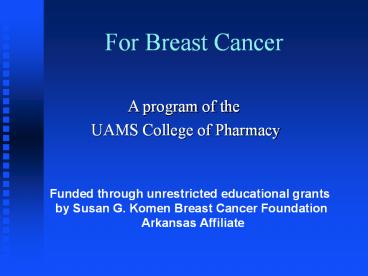For Breast Cancer PowerPoint PPT Presentation
Title: For Breast Cancer
1
For Breast Cancer
- A program of the
- UAMS College of Pharmacy
Funded through unrestricted educational grants
by Susan G. Komen Breast Cancer Foundation
Arkansas Affiliate
2
Overview of Breast Cancer
- Jan K. Hastings, Pharm.D.
3
Breast Cancer
- The most common form of cancer among women
- The second most common cause of cancer related
mortality - 1 of 8 women (12.2)
- One third of women with breast cancer die from
breast cancer
4
Risk Factors for Breast Cancer
- Female (1 male)
- Aging
- Relative (mother or sister)
- Menstrual history
- early on set
- late menopause
- Child birth
- After the age of 30
5
Exogenous Estrogen
- Hormonal replacement therapy(HRT)
- 30 increased risk with long term use
- Oral Contraceptives(OC)
- risk slight
- risk returns to normal once the use of OCs has
been discontinued
6
Risk Factors for Breast Cancer
- Radiation exposure
- Breast disease
- Atpyical Hyperplasia
- Intraductal carcinoma in situ
- Intralobular carcinoma in situ
- Obesity
- Diet
- Fat
- Alcohol
7
Genetics
- BRCA-1
- BRCA-2
- P53, Rb-1
- Her-2/neu, c-erB2, c-myc
8
Staging of Breast Cancer
- The American Joint Committee on Cancer (AJCC) has
designated staging by TNM - T tumor size
- N lymph node involvement
- M metastasis
9
Stage 1
- Tumor lt 2.0 cm in greatest dimension
- No nodal involvement (N0)
- No metastases (M0)
10
Stage II
- Tumor gt 2.0 lt 5 cm
- or
- Ipsilateral axillary lymph node (N1)
- No Metastasis (M0)
11
Stage III
- Tumor gt 5 cm (T3)
- or ipsilateral axillary lymph nodes fixed to
each other or other structures (N2) - involvement of ipsilateral internal mammary nodes
(N3) - Inflammatory carcinoma (T4d)
12
Stage IV (Metastatic breast cancer)
- Any T
- Any N
- Metastasis (M1)
13
Types of breast cancer
- In situ
- Intraductal (DCIS)
- Intralobular (LCIS)
- Invasive
- Infiltrating ductal carcinoma
- Tubular carcinoma
- Medullary carcinoma
- Mucinous carcinoma
14
Symptoms and Screening
15
(No Transcript)
16
(No Transcript)
17
Normal breast physiology and anatomy
- Symmetry and balance
- Size
- weight
- menstrual cycle
- pregnancy and lactation
- Texture
- Shape
- age
18
Abnormal signs and symptoms
- Puckering
- Dimpling
- Retraction
- Nipple discharge
- Thickening of skin or lump or knot
- Retracted nipple
19
Abnormal signs and symptoms
- Change in breast size
- Pain or tenderness
- Redness
- Change in nipple position
- Scaling around nipples
- Sore on breast that does not heal
20
Methods of Detection
- Clinical exam by MD or nurse
- Mammography
- Monthly breast self-exam (BSE)
21
Clinical examination
- Performed by doctor or trained nurse practitioner
- Annually for women over 40
- At least every 3 years for women between 20 and
40 - More frequent examination for high risk patients
22
Mammography
- X-ray of the breast
- Has been shown to save lives in patients 50-69
- Data mixed on usefulness for patients 40-49
- Normal mammogram does not rule out possibility of
cancer completely
23
Mammography
- American Cancer Society recommends
- Women (asymptomatic) 40 years of age and older
should have a mammogram every year.
24
Mammography-more guidelines
- Mammogram facility guidelines
- Avoid mammogram week before period
- Dont wear deodorant powder or cream
- Bring a list of the places and dates of other
mammograms,biopsies youve had before - If you dont hear from the MD within 10 days,
call the facility
25
Free Mammograms
- Medicare
- Arkansas Breast Cancer Control Program
- Breast and Cervical Cancer Control Program of the
Arkansas Department of Health
26
Medicare
- Women over 65
27
Arkansas Breast Cancer Control Program
- Started in 1999
- Eligibility
- Women 40 or older
- No insurance
- Income at or below 2 times the poverty level
- Call county or state heath department
- 1-800-482-5400
28
Eligibility for ABCCCP Mammogram
- 50 years or older and
- At or below 200 percent poverty
- OR
- Between 40 and 49 and
- A breast cancer survivor or have a mother,
daughter, or sister who has breast cancer and - At or below 200 percent poverty
29
Breast Self Examination
- Opportunity for woman to become familiar with her
breasts - Monthly exam of the breasts and underarm area
- May discover any changes early
- Begin at age 20, continue monthly
30
When to do BSE
- Menstruating women- 5 to 7 days after the
beginning of - their period
- Menopausal women -
- same date each month
- Pregnant women
- same date each month
- Takes about 20 minutes
- Perform BSE at least
- once a month
- Examine all breast tissue
31
Why dont more women practice BSE?
- Fear
- Embarrassment
- Youth
- Lack of knowledge
- Too busy, forgetfulness
32
Conclusion
- Pharmacists have a responsibility as patient
advocates for breast cancer awareness

